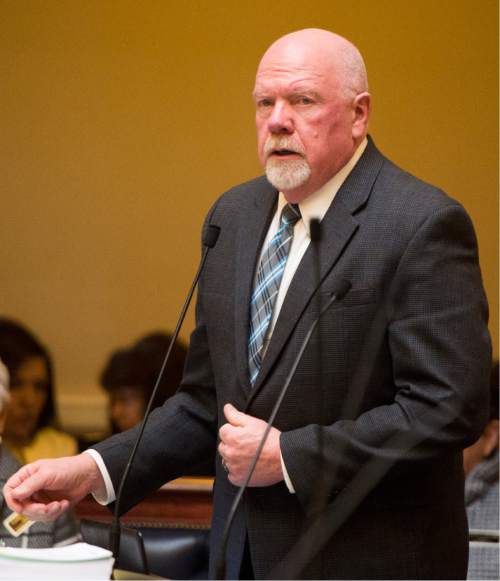This is an archived article that was published on sltrib.com in 2016, and information in the article may be outdated. It is provided only for personal research purposes and may not be reprinted.
State Auditor John Dougall's recent scathing audit of the Utah Local Governments Trust has the Utah Taxpayers Association claiming the waste and mismanagement uncovered is only the tip of the iceberg. Taxpayer money is misused when no one is "minding the store" of the invisible government entities most taxpayers have no idea even exist.
In his weekly HBO show "Last Week Tonight," comedian John Oliver exposed the ugly underbelly of America's most hidden level of government: 40,000 special service districts which spend $100 billion annually, more than Russia spends on its military.
Utah has hundreds of entities like this, most of them known as special service districts or interlocal agencies. These bodies have access to taxpayer money via assessments on the public funds of cities and counties, fees paid by homeowners and businesses or property taxes. The governing boards of these districts often include elected officials but most also include appointed individuals who have no accountability to taxpayers but whose votes are weighted the same as elected officials.
In 1984, State Auditor Val Oveson called special districts the "hidden level of government" but they have only continued to proliferate. Just this year Sen. Lincoln Fillmore's Senate Bill 235, which would have required elected officials to have the final say over special district tax increases, failed to get out of the Senate.
These districts cover a number of government services ranging from mosquito abatement to sewer and water to animal services. Most taxpayers are unaware of these entities, which means their actions are under the political radar. Since they are often forgotten, taxpayer money is often wasted, as is the case of the Local Governments Trust.
But one of the worst effects of special districts is that they often form a cartel to limit lower-cost competitive, free enterprise solutions. This is exactly what is happening with certain districts that deal with garbage along the Wasatch Front.
A group of five special service districts that provide garbage services along the Wasatch Front is considering an ill-conceived plan that will give government landfills the upper hand over their privately owned competitors. The special service districts have acted to move power even further from elected city and county councils by creating an agency called NUERA (Northern Utah Environmental Resource Agency), which seeks to expand control of trash flow along the Wasatch Front and limit competition from private sector providers, which may be in violation of federal antitrust law.
The five special service districts include the Weber County transfer station, Wasatch Integrated Waste Management District in Davis County, Trans-Jordan Landfill in south Salt Lake County, North Pointe Solid Waste Special Service District in northern Utah County and the South Utah Valley Solid Waste District in south Utah County.
There are a number of private sector landfills located up and down the Wasatch Front that have hundreds of years of life left to collect trash. These privately owned disposal facilities are accepting municipal and commercial waste at the lowest competitive rates. In spite of this, NUERA is seeking to get its five special service districts to cough up $5.7 million to purchase the Bayview landfill in the south end of Utah County which is already owned and operated by the South Utah Valley Solid Waste District.
The board that governs NUERA has passed a resolution allowing the entity to move forward with the transaction. The other participating entities are certain to not be far behind.
In mid-July, North Pointe Solid Waste Special Service District held a board meeting where the Bayview purchase was discussed publicly for the first time with most mayors and managers of the involved cities not even aware of the proposed transaction. The district has set a meeting for the end of August to discuss this matter again.
These discussions for this purchase have not been done in the open. Many meetings about this purchase have been done in closed sessions of the boards of these districts. In the case of North Pointe, the landfill acquisition was discussed in a closed session, as it was determined to be a real estate purchase, but the purchase was placed on a board meeting agenda only days before the board was set to vote on the purchase. How can the government purchase of another government entity not be more open and transparent? The question is, why the rush? Or better yet, why the purchase at all? Why are these five districts pursuing this purchase at this time and doing so behind closed doors?
In the greater Denver area, trash and landfills are nearly all privately owned and operated without government intervention or competition. Rates in Denver are much cheaper for landfill use than they are currently along the Wasatch Front. Clearly, the free market is doing its job in Denver, keeping prices at the correct level instead of government over inflating the market and raising prices on taxpayers.
Elected city and county officials and taxpayers in these districts should be concerned about this proposal and demand that their representatives on the special service district boards not act without approval of the full city or county council. The Legislature should act now to place financial decisions of special service districts back in the hands of elected bodies.
Howard Stephenson is president of the Utah Taxpayers Association and a state senator from Draper.



